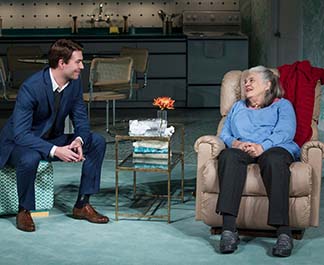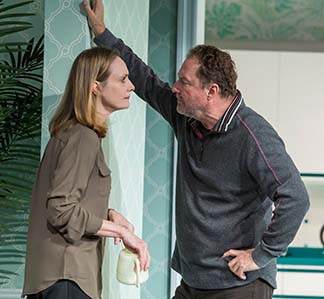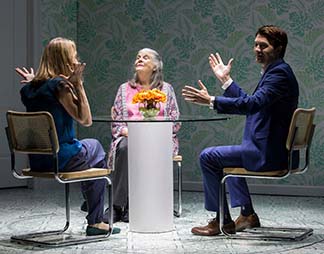By Lucy Komisar
Think of “prime” as the second version of something, sort of like the file you download twice, so the second has little 1 after it. Here it‘s not a file, but the vision of a person, maybe a holographic double.

In Jordan Harrison‘s sci fi computer era play about memory, an 85-year-old widow (Lois Smith) talks to the avatar of her late husband Walter (Noah Bean). Senior Serenity, a social agency, thinks “companionship is most important,” and so her son-in-law Jon (Stephen Root) programs the ersatz Walter with memories of the couple‘s life, so Marjorie can relive those moments. (Was her mind already slipping, or did her well-intentioned family provoke this?)
Too bizarre to imagine? Remember when many computer devices were sci fi, and now there are computerized robots, so who‘s to say? It‘s gimmicky, but engrossing.
Director Anne Kauffman also staged “The Nether,” another play about avatars, that one focused on evil, because the characters were perpetrators or victims of pedophilia. Is this now a genre? She keeps the same slightly chilling realism here. You buy into it.
The set looks like the model kitchen and living room of an apartment hotel. Not a sign of human residence, not a personal photo or the detritus of life. Only a potted plant. And some groceries brought by daughter Tess.

Walter, who died ten years before, comes back as young fellow of 35, and we learn that Marjorie chose him over another suitor, because he was a great lover. And who‘s to say you can‘t pick the age of the person you remember?
Lois Smith is a superlative Marjorie, her face and body language, every ripple of her forehead, every narrowing of her eyes speaking sorrow and weariness. She is often cantankerous. The play is a vehicle for Smith.

Walter, on the other hand, has the expressionless demeanor of a department store dummy, which would be deliberate. Wonder why her memory can‘t call up any passion in him.
What do you remember when computer memory (a pun, right!) is programmed to call up best moments? Marjorie recalls playing Vivaldi on the violin. And visiting New York in winter when Central Park was filled with saffron-colored flags set in snow. (The characters don‘t mention artist Christo) But Jon does not tell the computer-robot-Walter about the sorrowful death of Marjorie‘s introverted son Damien.
Marjorie‘s daughter Tess (Lisa Emery), Jon‘s wife, is always edgy, nervous, irritable, rigid, controlling. At a certain moment, Tess begins to talk to her mother in the past tense. Marjorie, who now looks livelier, bright, vivacious, asks questions about herself. She moves to the couch where Walter sat.
Jon explains, “She‘s made of things we say to her.”
Tess: “I might as well talk to you.”
Jon: “But you don‘t.”
They‘ve been married for 29 years.
What are we to make of all this? Tess argues that in age you have no more experiences: “There‘s the half where you live and the half where you live through other people. / And your memory of when you were young.” (When is the first half over?)
And Tess adds, ˜I don‘t know why we have to keep each other alive for so long.” (Any cutoff date recommended?)

What about the value of the avatar. As the system claims another victim, Jon will say it is “like a backboard, talking to myself.” The comfort robot of the future? A bit eerie. Playwright Harrison doesn‘t make the case that memory is bad, or that it can or should be selective. He is just musing on a future where memory is programmed by others. Worth seeing for Lois Smith.
“Marjorie Prime.” Written by Jordan Harrison; directed by Anne Kauffman. Playwrights Horizons, 415 West 42nd Street, New York City. (212) 279–4200. Opened Dec 14, 2015; closes Jan 24, 2016. 1/4/16.

